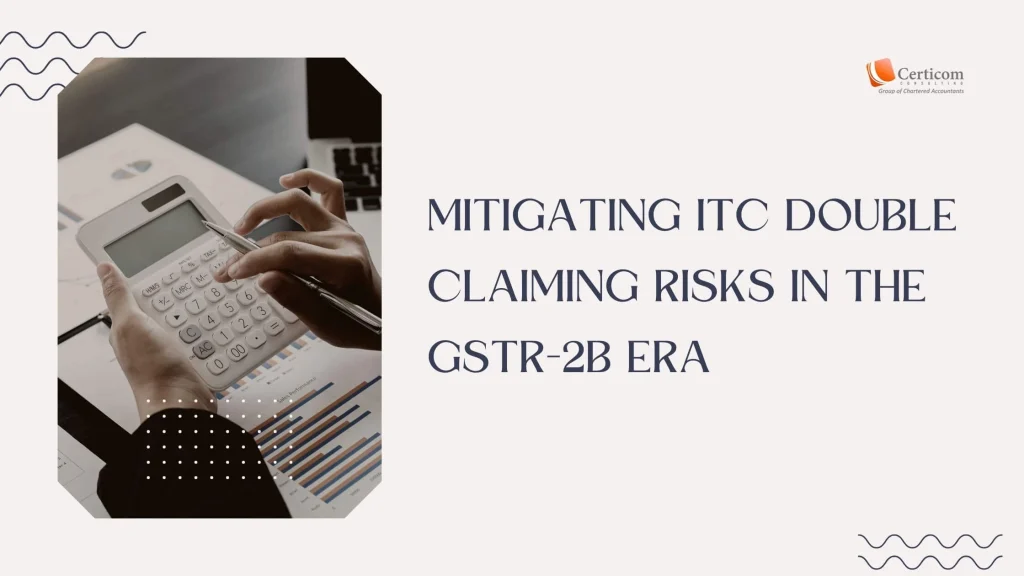Mitigating ITC Double Claiming Risks in the GSTR-2B Era

1. Understanding the Transition to GSTR-2B
The Shift from GSTR-2A to GSTR-2B
The introduction of GSTR-2B in January 2022 marked a major transformation in India’s GST compliance framework. This change made GSTR-2B the definitive source for Input Tax Credit (ITC) claims, replacing GSTR-2A. The amendment through Section 16(2)(aa) of the CGST Act linked ITC eligibility strictly to supplier-reported invoices, eliminating prior flexibility.
Why This Matters Now
With increased audit scrutiny by GST authorities, particularly for FY 2021-22, businesses must ensure compliance. The transition phase has resulted in inadvertent double claims due to overlapping systems, making it essential to review ITC claims carefully.

2. Risks and Consequences of ITC Double Claiming
How Double Claiming Happens
A common pitfall in compliance arises from the shift to GSTR-2B. Consider this case: A manufacturing company claimed ₹10,000 ITC in its December 2021 GSTR-3B based on books, following Rule 36(4), since the supplier had not yet filed GSTR-1. When the supplier finally uploaded the invoice in January 2022, it appeared in GSTR-2B, automatically updating GSTR-2A. Unaware of the prior claim, the accounts department claimed the same ₹10,000 again in the January 2022 GSTR-3B.
Financial and Compliance Risks
Double claiming ITC leads to serious repercussions, including:
Mandatory Reversal: Excess ITC must be reversed via DRC-03 without exceptions.
Interest Liability: 18% p.a. interest under Section 50 applies from the date of utilization until reversal.
Penalties:
Non-fraudulent cases (Section 73): 10% of excess ITC or ₹10,000 (whichever is higher).
Fraudulent cases (Section 74): Penalties up to 100% if intent is established.
Audit Scrutiny: GST authorities thoroughly examine ITC claims, leading to potential disputes.
3. Strategies to Prevent Double Claiming
Step 1: Review Pre-January 2022 ITC Claims
Examine GSTR-3B filings before January 2022 to track ITC claimed through books or GSTR-2A. Maintain detailed records of invoice details, including numbers, dates, GSTINs, and amounts.
Step 2: Cross-Check ITC Claims Post-January 2022
Compare ITC claimed in GSTR-3B from January 2022 onward against GSTR-2B data. Any matching entries require immediate reconciliation.
Step 3: Reconcile Books with GSTR-2B
Ensure each invoice appears only once in the purchase register. This is especially crucial for businesses with multiple branches or teams managing accounting processes.
Step 4: Utilize GST Portal Tools
The “Tax Liabilities & ITC Comparison” report provides a clear picture of discrepancies by comparing ITC claimed in GSTR-3B against available ITC in GSTR-2B.
Step 5: Verify Invoice Data
Cross-check invoice numbers, dates, and amounts to identify duplicates and prevent unintentional double claims.
4. Legal Implications and Remedial Actions
Audit Insights and Departmental Observations
Since January 2022, GSTR-2B has become the sole basis for ITC eligibility. Any ITC claimed in excess of GSTR-2B amounts is treated as wrongful availment. While GSTR-2A remains useful for monitoring supplier compliance, it no longer determines ITC eligibility.

Consequences of Non-Compliance
Failure to comply results in:
Mandatory ITC Reversal: Businesses must reverse excess ITC with interest, regardless of intent.
Penalties: Depending on the case, penalties under Sections 73 and 74 can significantly increase financial liabilities.
5. Conclusion: Strengthening ITC Compliance
To ensure seamless GST compliance, businesses must:
Strengthen ITC reconciliation processes.
Monitor supplier GSTR-1 filings regularly.
Utilize GST portal tools to detect discrepancies early.
By proactively addressing ITC double claiming risks, businesses can reduce financial liabilities, avoid interest and penalties, and prevent unnecessary audits and disputes.
Related Post
A Beginner’s Guide to E-Filing Income Tax Return for FY 2024-25
Faking Tax Deductions? You Could Be Penalised Up To 200% Under Income Tax Rules
Book A One To One Consultation Now For FREE
How can we help? *




